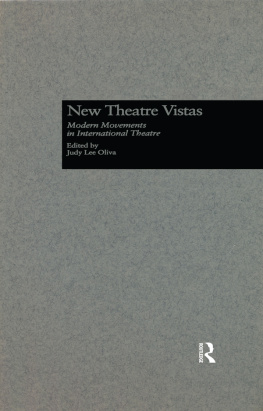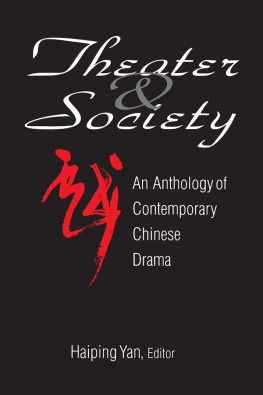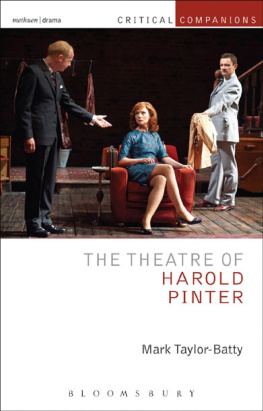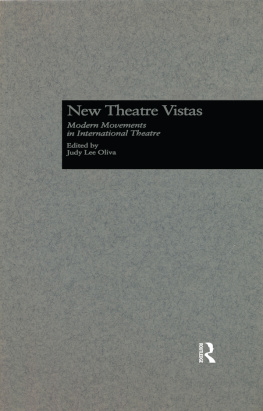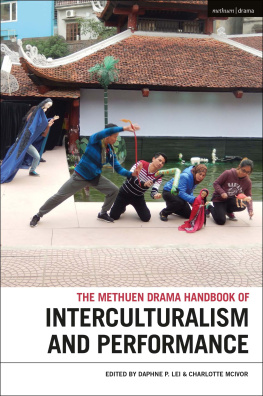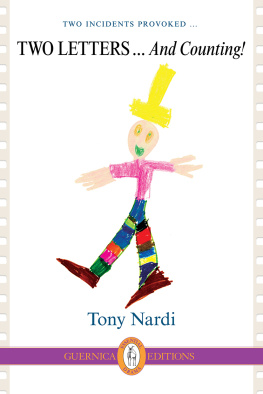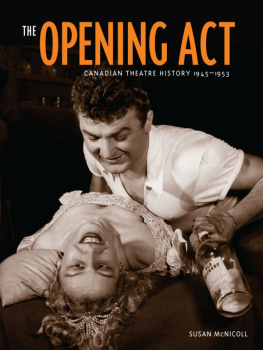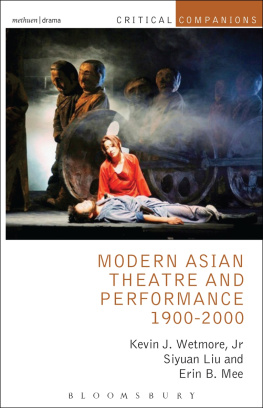I wish to thank Pam Allen for her patient and careful formatting of the book and for her moral support throughout this project. The departmental staff at the University of Tennessee deserve mention for help with the international correspondence, and for helping me deal with the computer challenges that this kind of project inherently meets. Those special people include: Sue Dodd, Shari Taylor, Sharon Ward and Kelli Blair. I am especially grateful to Barbara Komer and Greg Kunesh, my colleagues at other universities who read and offered commentary in the initial stages of my writing. My colleagues at the University of Tennessee share my enthusiasm for international theatre. I am particularly thankful to Bob Cothran, with whom I shared many insightful discussions about theatre and the collaborative process. Above all, I am thankful to my husband Bruce, who reminds me of the important things in life and who remains my source of inspiration.
by Richard Trousdell
The Pride of the Clyde
The River Clyde flows through Glasgow, dividing the city center on the north bank from the devastated Gorbals working-class districts on the south. Like the river for which it is named, the Clyde Unity Theatre of Glasgow reflects class issues that divide the city, a common Scottish identity that binds it together, and the focused energy that carries the citys creative life out into the country and beyond.
Aileen Ritchie and John Binnie founded Clyde Unity Theatre in 1986 and, as co-creators of its twenty or so productions, they have made it Scotlands leading radical touring theatre company. Both Ritchie and Binnie had wanted to be actors, but not by playing what they saw as stereotypical roles in Scotlands commercial theatre. Ritchie, a large woman and a feminist, knew that she would likely be cast in subsidiary parts as mother, wife, or whore, where women are seen only in relation to men. Binnie, a working-class gay man, knew that if he were to be cast at all he would have to change his accent and pretend to be straight.
Instead, they decided to start their own theatre that would not hide issues vital to them as young Scots growing up and living in modern Glasgow. Starting from who and what they were, Ritchie and Binnie hoped to reach beyond Glasgows center to a neglected Scottish audience in public housing schemes, unemployed worker centers, oldage pensioner homes, and small town venues throughout the country:
Our two main areas of worktouring with new Scottish plays and community-based devised showsshare the same goals. We aim to use entertainment to make people question their own attitudes towards social issues, such as sexuality, health, race and the position of women in Scottish society. Or, more simply, we are committed to a form of theatre which puts ordinary Scottish characters on stage without resorting to stereotypes such as the hardman and his girlfriend. In our productions we aim to use comedy and emotive writing to present a picture of society which celebrates the Scottishness which unites us while promoting the right of the individual to be different.
The American Connection
The assertive Scottish identity of Clyde Unity Theatre has strong cross-cultural roots. Ritchie and Binnie modelled their theatre in part on the old Glasgow Unity Theatre, a left-wing, social action group of the 1940s and 1950s that toured original plays to working-class venues and produced Scotlands first openly gay play, Lambs of God by Benedict Scott in 1948. As Binnie knew from research he did for his senior thesis at the University of Glasgow, the original Glasgow Unity Theatre found inspiration in the example of Americas Group Theatre. In aligning itself with an international theatre movement, the new Clyde Unity Theatre not only connected to its Scottish roots, but also adopted goals of social activism, popular audience development, and collaborative methods at the heart of Americas most famous theatre of social consciousness.
A more contemporary American influence on Clyde Unity is the impact of Broadway and Hollywood musicals. The mythology of Judy Garland and Mickey Rooney is a direct source for Clyde Unity plays such as Beyond the Rainbow, MacWizard Fae Oz, and Weeuns in the Wid The Garland & Rooney can-do! spirit is also mirrored in Ritchie & Binnies self-presentation as a team of feisty outsiders who use energy, determination and show biz smarts to challenge the establishment. Clyde Unitys extensive borrowing from American pop culture points to a central theme in their work about how American ideas shape Scottish life.
American songs are featured extensively in Clyde Unity productions, signalling the Companys retro style as well as its taste for cross-cultural parody. In their most frequently performed play, Killing Me Softly , a beguiling American ballad is played off against the fact of AIDS, making clear that what kills softly in Scotland isnt a song, but rather shame about ones sexuality. The emotional power of American music is even more the subject of Binnies award-winning Beyond the Rainbow. In it, the character of Judy Garland reveals the techniques she uses to sell the famous song she secretly loathes. In the process, she disenchants a Scottish fan who has tried to escape the ordinary facts of his life by living the fantasy of hers. To an American, these examples suggest that Clyde Unity has a love-hate relationship with its American connection. On the one hand it pays tribute to American glamor and accomplishment, but on the other it offers a strong critique of American sentimentality, materialism, and self-preoccupation. To a Scot, like playwright John Binnie, the theme has a somewhat different meaning:
Our critique of America isnt really about America, but more about Hollywood. I love the movies, and Hollywoods so powerful, and magicaland Im interested [in] how that dream factory affects Scotland. It transports us, and stimulates and excites us. But sometimes, we can get so caught up in it, that we forget our own real lives. Hollywood makes the American Dream so potent, but I think so few people understand what it is to be Scottish. Our culture is often disparaged, or ignored.
New Directions
Given Clyde Unitys focus on Scottish-American themes, it was perhaps inevitable they would invite two Americans to join the Company. Actor Joan Jubett and I were chosen for their 1993 Edinburgh Festival season because we had staged the 1991 American premiere of Binnies Killing Me Softly at the University of Massachusetts, and so we were known and trusted. A deeper and less explicit reason for our invitation was that this tight-knit Company sensed it was changing and needed to change, but it wasnt sure how. Its growing success, for example, meant that Binnie and Ritchies individual careershis in writing, hers in filmwere starting to take off and to carry them beyond Clyde Unity. Would new eyes from the outside help them to see where they were going and to clarify the new direction in which the Company ought to move? And if they could no longer be with Clyde Unity full-time, could someone else step in and make sense of their work? Maybe; it was worth a try.
Bobbie: Weve forgotten one thing.
Mari: What?
Elspeth: The schools show.
Bobbie: Youll have to come back from adult responsible-hood to join us for one last time.
Ruth: My part would have to be stunning for me to come out of retirement.
Mari: And the show would have to have a social function.
Bobbie: But what can we do? Elspeth: Improvise!
All: Improwhat?
Elspeth: Dont take it too seriously.
Bobbie: Im scared.
Ruth: Same here.
When the World Was Young
A major goal of our cross-cultural work, then, proved to be a traditional one: to see if an outside perspective could help reveal a native process more clearly. There were two projects for collaboration. First, we were going to revise and restage When the World Was Young , an early play from Clyde Unitys repertory that was a company favorite, but which they felt had never fully worked in production. The plays first halfBinnies autobiographical account of growing up gay in a small Scottish townwas funny and tender, but then the plot became issue-heavy as the action shifted to the grownup lives of its characters. Could we help shape a new ending that would somehow pull the plays comic and serious threads together? Until this project, no Clyde Unity play had ever been interpreted by outside sources. Normally, each of its productions is written for a core company of two men and two women--most of whom act, write, and directand is then worked out on-the-spot by the playwright, acting as director. In this way, playwriting, acting, or directing are overlapping functions at Clyde Unity rather than exclusively defined roles. Now, for the first time, the Company was interested to see how an outside director would interpret one of its plays. Among other things, they hoped I would bring a more psychologically oriented approach to When the World Was Young what they called my American Method styleas one way to refashion the work and find its ending. Sometimes working in another culture means getting stuck with the labels for your own--and then trying to see if they fit.

